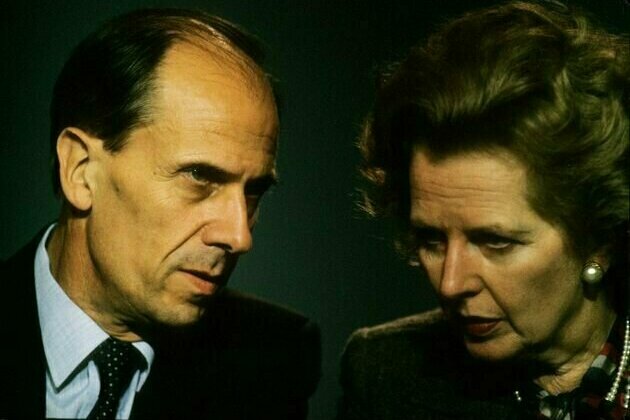Norman Tebbit, Conservative minister known as Thatcher's enforcer, dies at 94
The Conversation
08 Jul 2025, 17:11 GMT+10

No man more embodied Thatcherism in the eyes of the public in the 1980s than Norman Tebbit, who died on July 7, aged 94.
Though certainly no yuppie, Lord Tebbit entitled his memoirs Upwardly Mobile. Margaret's Thatcher's triumph was also his. She saw in the Essex MP just the uncompromising approach to transforming Britain to which she too was committed.
Both had been disgusted by the Conservative government of Edward Heath blinking when it sought to face down trade unions in the early 1970s. The experience was elemental to their plan for government.
Others were more important to the New Right/neoliberal project elected in 1979: Conservative minister Keith Joseph, and Thatcher's two chancellors, Geoffrey Howe and Nigel Lawson.
But Tebbit provided something no one else in Thatcher's cabinet could: an innate connection with white, working-class voters, who may once have been Labour - Tebbit lauded Clement Attlee and Ernest Bevin - but whose values were held to have been washed away in the postwar tide of union militancy, social permissiveness, European integration, and mass immigration.
Get your news from actual experts, straight to your inbox. Sign up to our daily newsletter to receive all The Conversation UK's latest coverage of news and research, from politics and business to the arts and sciences.
He became a Conservative almost because, rather than in spite, of his background. "Essex man" was a presiding personification of the period.
Unlike almost all of Thatcher's ministers, Tebbit did not go to university, but left school at 16 to encounter the "closed shop": that one had to be a member of a particular union to work in a particular workplace. He became determined at that moment to end this practice, and with it so much else of postwar social democracy.
Thirty years later he did, as Thatcher's secretary of state for employment. Tebbit's 1982 Employment Act avenged the unions' defeat of Heath. Union rights were weakened, never to be restored, and those of employers emboldened. It was a significant contribution to Thatcherism's ledger.
As secretary of state for trade and industry, Tebbit pursued privatisation - the return (as its proponents, simply, put it) of nationalised industries to the private sector - with passion. The postwar settlement in Britain was being upended.
In an age before the televising of parliament (much less 24-hour news and social media), Tebbit cut through in a way few politicians did.
At at a time of inner-city violence, the public knew Tebbit's unemployed father, decades earlier, didn't riot but "got on his bike and looked for work". No one else could have been called - in the words of Labour's Michael Foot - a "semi-house-trained polecat". TV's puppet satire Spitting Image portrayed him as the "Chingford Strangler", dressed in biker leathers.
Tebbit felt no need for his contempt for socialism to be leavened by charm or humour. There was invariably a slight sense of menace. He had no interest in ingratiating or propitiating. And so he was as loved by Conservative party members as he was hated by the left. He welcomed their hatred.
Tebbit in particular despised the swinging 60s - fittingly, he entered parliament in the election in which Harold Wilson's government was unexpectedly ejected - and its legacy of "insufferable, smug, sanctimonious, naive, guilt-ridden, wet, pink orthodoxy". Thus his trenchancy on immigration, overseas aid (a "sink of iniquity, corruption and violence"), sexuality (he was one of the few still to use the word "sodomite") and Europe (he was a Eurosceptic before Euroscepticism).
In 1990 Tebbit asked of British-born people of Asian heritage: "Which side do they cheer for? Are you still harking back to where you came from or where you are?". Tebbit's "cricket test" is second only to Enoch Powell's "rivers of blood" speech in the annals of inflammatory - they and their supporters would say candid - rhetoric relating to immigration. Neither would mind the association.
Read more: Tory humiliation down to campaign length and cult of May - Norman Tebbit Q&A
What silenced most - if not quite all - of his critics, was Tebbit at his most vulnerable. Following the IRA bombing of the Grand Hotel Brighton in 1984, live television footage of him, only partially clad in his pyjamas, covered in dust, being stretchered out of the rubble, became the defining image of the atrocity.
The following year Thatcher moved him from trade and industry to, less happily, chairman of the Conservative party. It was a job that required a lighter touch than Tebbit's.
Nevertheless, as chairman, he delivered the Conservatives' third election victory, of 1987 - ensuring the permanence of the transformation - only to immediately retire to the backbenches. Margaret, his wife, had been paralysed by the bomb, and he devoted himself to her care for more than 30 years until her death.
As warranted as his departure from government may have been, Thatcher "bitterly regretted" losing him, a feeling she felt for few. Her defenestration in November 1990 is much harder to imagine had Tebbit still been in the cabinet.
Norman Tebbit's conservatism and nationalism harked back to an earlier age, yet presaged the populism of the 2020s. In his remarks following the news of Tebbit's death, Nigel Farage said he thought him "a great man".
Tebbit's values endure in public discourse, in more ways than he might have expected even a few years ago. But in his last months he was either unable, or unwilling, to say whether those values were those of the Conservatives, the traditional party of the right, or of another project. That may be a final Tebbit "test".
 Share
Share
 Tweet
Tweet
 Share
Share
 Flip
Flip
 Email
Email
Watch latest videos
Subscribe and Follow
Get a daily dose of Massachusetts Sun news through our daily email, its complimentary and keeps you fully up to date with world and business news as well.
News RELEASES
Publish news of your business, community or sports group, personnel appointments, major event and more by submitting a news release to Massachusetts Sun.
More InformationInternational
SectionU.S. Treasury Secretary says Musk should steer clear of politics
WASHINGTON, D.C.: Elon Musk's entry into the political arena is drawing pushback from top U.S. officials and investors, as his decision...
TikTok building U.S.-only app amid pressure to finalise sale
CULVER CITY, California: TikTok is preparing to roll out a separate version of its app for U.S. users, as efforts to secure a sale...
Trump defends use of 'Shylock,' citing ignorance of slur
WASHINGTON, D.C.: President Donald Trump claimed he was unaware that the term shylock is regarded as antisemitic when he used it in...
Summer travel in chaos as French air traffic controllers walk off job
PARIS, France: A strike by French air traffic controllers demanding improved working conditions caused significant disruptions during...
Congress weighs Medicaid cuts, sparking alarm in small-town hospitals
OMAHA, Nebraska: With Congress considering cuts totaling around US$1 trillion to Medicaid over the next decade, concerns are rising...
Gas station blast injures 40 in Rome, kids narrowly escape
ROME, Italy: Quick thinking by emergency responders helped prevent greater devastation after a gas station explosion in southeastern...
Business
SectionBeijing blamed for covert disinformation on French fighter jet Rafale
PARIS, France: French military and intelligence officials have accused China of orchestrating a covert campaign to damage the reputation...
Birkenstock steps up legal battle over fakes in India
NEW DELHI, India: Birkenstock is stepping up its efforts to protect its iconic sandals in India, as local legal representatives conducted...
Beijing hits back at EU with medical device import curbs
HONG KONG: China has fired back at the European Union in an escalating trade dispute by imposing new restrictions on medical device...
Wall Street reels after Trump invokes new tariffs
NEW YORK, New York - Monday's trading session saw mixed performances across U.S. and global markets, with several major indices posting...
Trump admin allows GE to restart engine sales to China’s COMAC
WASHINGTON, D.C.: The U.S. government has granted GE Aerospace permission to resume jet engine shipments to China's COMAC, a person...
Saudi Aramco plans asset sales to raise billions, say sources
DUBAI, U.A.E.: Saudi Aramco is exploring asset sales as part of a broader push to unlock capital, with gas-fired power plants among...













